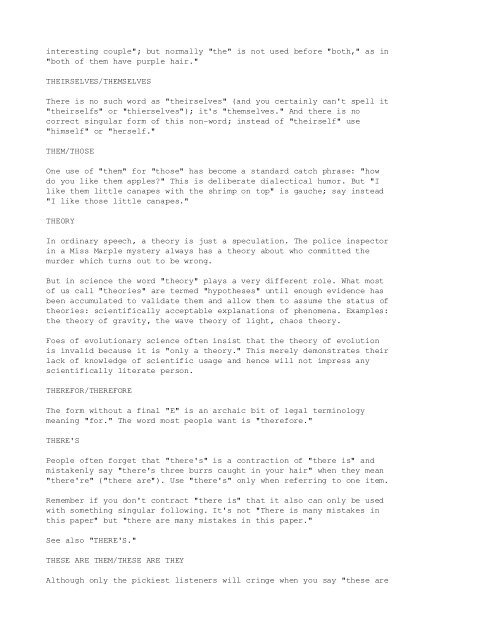Common_Errors_in_English_usage
Common_Errors_in_English_usage
Common_Errors_in_English_usage
Create successful ePaper yourself
Turn your PDF publications into a flip-book with our unique Google optimized e-Paper software.
<strong>in</strong>terest<strong>in</strong>g couple"; but normally "the" is not used before "both," as <strong>in</strong><br />
"both of them have purple hair."<br />
THEIRSELVES/THEMSELVES<br />
There is no such word as "theirselves" (and you certa<strong>in</strong>ly can't spell it<br />
"theirselfs" or "thierselves"); it's "themselves." And there is no<br />
correct s<strong>in</strong>gular form of this nonword; <strong>in</strong>stead of "theirself" use<br />
"himself" or "herself."<br />
THEM/THOSE<br />
One use of "them" for "those" has become a standard catch phrase: "how<br />
do you like them apples?" This is deliberate dialectical humor. But "I<br />
like them little canapes with the shrimp on top" is gauche; say <strong>in</strong>stead<br />
"I like those little canapes."<br />
THEORY<br />
In ord<strong>in</strong>ary speech, a theory is just a speculation. The police <strong>in</strong>spector<br />
<strong>in</strong> a Miss Marple mystery always has a theory about who committed the<br />
murder which turns out to be wrong.<br />
But <strong>in</strong> science the word "theory" plays a very different role. What most<br />
of us call "theories" are termed "hypotheses" until enough evidence has<br />
been accumulated to validate them and allow them to assume the status of<br />
theories: scientifically acceptable explanations of phenomena. Examples:<br />
the theory of gravity, the wave theory of light, chaos theory.<br />
Foes of evolutionary science often <strong>in</strong>sist that the theory of evolution<br />
is <strong>in</strong>valid because it is "only a theory." This merely demonstrates their<br />
lack of knowledge of scientific <strong>usage</strong> and hence will not impress any<br />
scientifically literate person.<br />
THEREFOR/THEREFORE<br />
The form without a f<strong>in</strong>al "E" is an archaic bit of legal term<strong>in</strong>ology<br />
mean<strong>in</strong>g "for." The word most people want is "therefore."<br />
THERE'S<br />
People often forget that "there's" is a contraction of "there is" and<br />
mistakenly say "there's three burrs caught <strong>in</strong> your hair" when they mean<br />
"there're" ("there are"). Use "there's" only when referr<strong>in</strong>g to one item.<br />
Remember if you don't contract "there is" that it also can only be used<br />
with someth<strong>in</strong>g s<strong>in</strong>gular follow<strong>in</strong>g. It's not "There is many mistakes <strong>in</strong><br />
this paper" but "there are many mistakes <strong>in</strong> this paper."<br />
See also "THERE'S."<br />
THESE ARE THEM/THESE ARE THEY<br />
Although only the pickiest listeners will cr<strong>in</strong>ge when you say "these are





